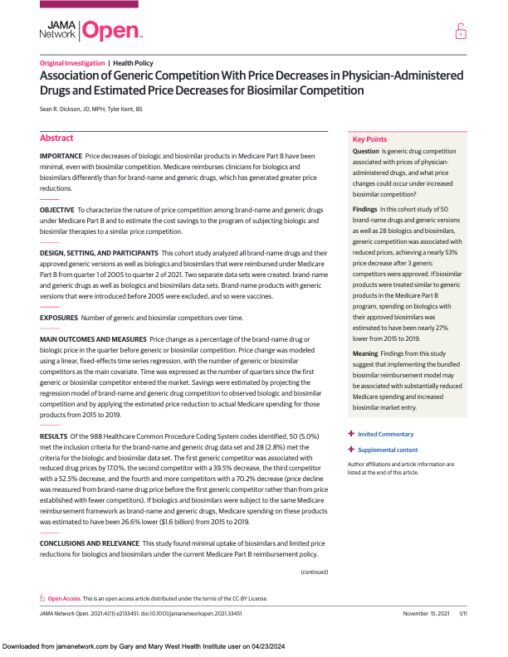Association of Generic Competition With Price Decreases in Physician-Administered Drugs and Estimated Price Decreases for Biosimilar Competition
The document is a comprehensive study examining the pricing trends of biologics and biosimilars under Medicare Part B, particularly noting the minimal price reductions even with biosimilar competition due to the existing reimbursement policies. The study analyzed the impact of generic competition on drug prices from 2005 to 2021, revealing significant price decreases with the entry of generic competitors: a 17.0% reduction with one generic, 39.5% with two, 52.5% with three, and 70.2% with four or more. This price decline underscores the potential for substantial cost savings under a more competitive biosimilar market framework.
The study also projected potential savings if Medicare Part B had adopted a bundled biosimilar reimbursement model. It estimated that Medicare spending on selected biologics and biosimilars could have been reduced by 26.6% ($1.6 billion) from 2015 to 2019. This finding suggests that aligning the reimbursement model for biosimilars with that of generics could drive down prices and foster greater market competition, which currently suffers due to the separate reimbursement policy for each biologic and biosimilar.
The current reimbursement strategy encourages the use of higher-cost options, thereby reducing the uptake of biosimilars compared to other international healthcare settings where competitive pricing strategies are more common. The study advocates for policy reforms that would align the reimbursement of biosimilars with generic drugs, potentially leading to increased biosimilar market entry and reduced Medicare expenditures. This shift could significantly impact Medicare spending, given that biologics account for a major portion of prescription drug spending under Medicare Part B.




